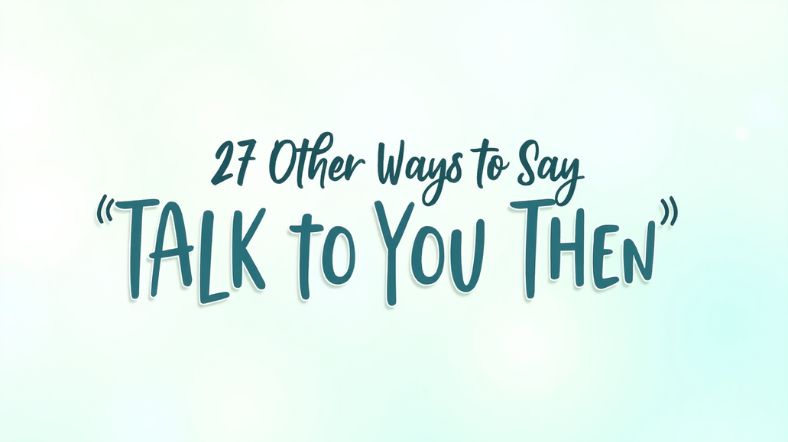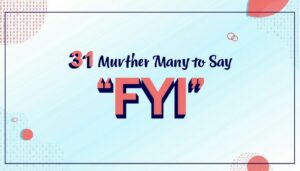When it comes to signing off conversations, we all love a little variety, right? Saying “Talk to you then” is familiar and friendly, but mixing it up can add a refreshing touch to your interactions.
Whether you’re wrapping up a casual chat with a friend or closing a professional email, choosing the right phrase can set the tone for the next time you connect.
In this article, we’ll explore 27 alternative ways to say “Talk to you then,” offering different nuances that fit both professional and casual settings.
Catch You Later
A casual and friendly way to say goodbye, “Catch you later” suggests a future meeting or conversation without any formalities. It’s a great fit for informal settings with friends, colleagues, or acquaintances.
Example: “Catch you later, we’ll chat about the project next week.”
Speak Soon
This phrase implies you’ll be in touch shortly. It’s friendly but slightly more formal than “Catch you later,” making it ideal for both personal and professional conversations.
Example: “Thanks for the update! Speak soon.”
Until Next Time
A bit more thoughtful, “Until next time” hints at a future interaction while offering a polite, optimistic farewell.
Example: “It was great catching up with you! Until next time.”
Chat Later
Similar to “Talk to you then,” “Chat later” is a laid-back way of saying you’ll continue the conversation at a later time. It’s perfect for a quick, friendly sign-off.
Example: “Alright, chat later about the details!”
Another Way to Say Talk to You Soon
“Talk to you soon” is an expression of anticipation, signaling that you’ll continue the conversation shortly. If you want something a bit different, you can try saying “Catch you later,” which gives the same friendly vibe but is slightly more casual.
Example:
- “Great meeting with you today! Catch you later, we’ll pick this up tomorrow.”
This phrase can be used in both personal and professional contexts, making it a versatile choice. It communicates that the conversation will continue, without an exact time commitment, leaving room for flexibility.
Speak to You Then
“Speak to you then” is a great alternative when you want to convey a slightly more formal tone. This phrase is perfect for professional emails or conversations where you want to keep things polite but not overly stiff. It suggests a more structured follow-up, often with a set time in mind.
Example:
- “Thank you for the details. Speak to you then when the report is ready.”
This phrase works well in business or formal settings, where clarity and professionalism are important, but you still want to leave the conversation on a positive note.
Talk Soon Synonyms
When you want to mix things up, there are a variety of phrases that can stand in for “Talk soon,” each offering a different nuance. Some of these include:
- “Catch you soon”
- “Speak soon”
- “Chat with you later”
- “Until then”
Each of these alternatives conveys the same sense of optimism that the conversation will continue, but you can choose the one that best suits the tone of the situation.
Example:
- “I’ll follow up with the details later. Catch you soon!”
The beauty of these synonyms is that they can be casual or professional, depending on how you phrase the sentence. Use them to keep your conversations fresh and engaging.
Talk to You Soon Synonym
A great synonym for “Talk to you soon” is “See you soon.” It’s simple, effective, and can be used in a wide range of contexts. While it’s commonly used in face-to-face situations, it also works well in emails and phone conversations, offering a nice balance between warmth and professionalism.
Example:
- “Thanks for the insights! See you soon and we’ll finalize everything.”
This phrase is a bit more informal than others, which makes it ideal for situations where you want to maintain a friendly and approachable tone while keeping things professional.
See You Around
This phrase adds a touch of familiarity and often suggests that you’ll cross paths again soon. It works well in casual conversations or when you don’t have a specific time set for the next meeting.
Example: “Enjoy your lunch! See you around.”
Talk Soon
A straightforward and warm way to express that you’ll speak again soon. It’s applicable in both personal and professional contexts, without sounding too formal.
Example: “I’ll get back to you by Friday. Talk soon!”
Until We Meet Again
This phrase has a slightly more formal, poetic tone and is often used when you know the next interaction will be a little further away.
Example: “Thanks for everything today, until we meet again.”
Connect Later
Great for professional contexts, “Connect later” is an excellent way to convey that you’ll continue discussions in the future.
Example: “I’ll send over the report tomorrow. Connect later!”
I’ll Be in Touch
“I’ll be in touch” is ideal for formal settings and indicates that you will contact the person again in the future. It carries a professional tone and assures the other person of future communication.
Example: “I’ll be in touch with the next steps after the meeting.”
Talk to You Later
Slightly less formal than “Talk to you then,” this phrase still maintains a friendly, approachable tone. It’s versatile and works well in most scenarios.
Example: “Good luck with the presentation! Talk to you later.”
Looking Forward to Our Chat
This phrase adds a bit of anticipation and enthusiasm to the conversation. It’s ideal when you’re eager for the next discussion.
Example: “I’ll review the proposal and get back to you. Looking forward to our chat.”
Stay in Touch
“Stay in touch” suggests an ongoing connection and is perfect when you want to encourage continued communication.
Example: “It’s always a pleasure talking with you. Stay in touch!”
Talk to You Then Meaning
When you say “Talk to you then,” it generally means that you will communicate again at a specific future time. It’s often used as a casual or friendly way to close a conversation, signaling that you’ll reconnect soon.
Talk to You Then Reply
A simple reply to “Talk to you then” could be as easy as:
- “Looking forward to it!”
- “Sounds good, talk soon!”
- “Catch you then!”
These responses keep the conversation light and convey that you’re eagerly anticipating the next chat.
Talk to You Then Synonym
Some of the synonyms for “Talk to you then” include phrases like “Talk soon,” “Catch you later,” and “See you later.” These all carry the same friendly tone but may vary in formality.
Talk to You Then Professional
In a professional setting, using a phrase like “Looking forward to our conversation” or “I’ll be in touch” is more suitable than a casual “Talk to you then.”
Example: “I’ll send you the contract draft soon. Looking forward to our conversation.”
Speak Then Meaning
“Speak then” is used to confirm a planned conversation or meeting at a specific time in the future. It’s simple but clear and can be used in both informal and formal settings.
Example: “We’re scheduled for 3 PM. Speak then!”
Speak Then in Email
In email correspondence, you could use “Speak then” to wrap up a discussion about future meetings or calls.
Example: “I’ll follow up with the details shortly. Speak then.”
Speak Then or Talk Then
Both “Speak then” and “Talk then” are often interchangeable, but “Talk then” is a little more casual and conversational, while “Speak then” may come off as slightly more formal.
Example:
- “Speak then when I return from my meeting.” (formal)
- “Talk then, can’t wait!” (casual)
Talk to You Soon
“Talk to you soon” is one of the most commonly used alternatives. It’s universally understood, warm, and adaptable to almost any context—whether professional or informal.
Example: “I’ll get back to you with the answers soon. Talk to you soon!”
Talk to You Then or Than
The correct usage is “Talk to you then.” “Than” is a comparative conjunction, so it’s important to use “then” when referring to future communication.
Talk to You Then Formal
In formal situations, you may want to choose something a little more polished, like “I look forward to our conversation” or “I will be in touch with you.”
Example: “It was a pleasure meeting with you today. I look forward to our conversation.”
Talk to You Then Quotes
Inspirational quotes can also serve as a sign-off that conveys positive anticipation. For example, “The best is yet to come,” could subtly suggest that you look forward to your next chat.
Conclusion
As you can see, there are numerous alternatives to saying “Talk to you then,” each suited to different tones, settings, and levels of formality.
By experimenting with these phrases, you can tailor your communication style to fit any situation, making your interactions feel more personal, professional, or friendly.
Whether in emails, casual conversations, or formal meetings, having a variety of ways to say goodbye can help you leave a positive impression and maintain connection.
So, next time you sign off, try using one of these alternatives to add a little flair to your farewell!

Mark Tony is a grammar expert with 5 years of experience, specializing in teaching English grammar, enhancing writing, reading, and speaking skills for diverse learners.









